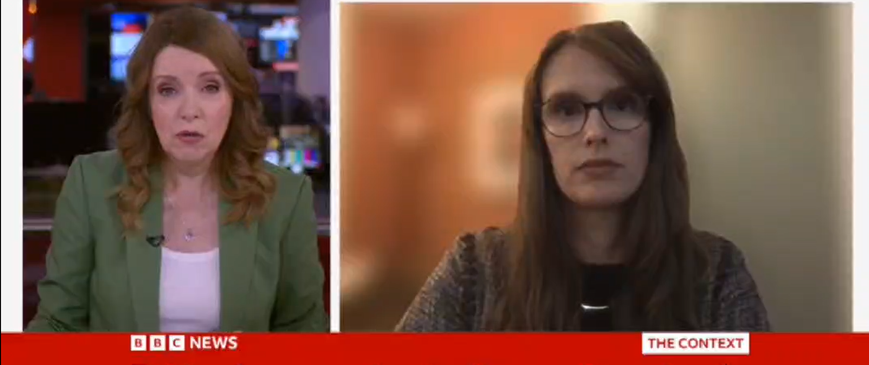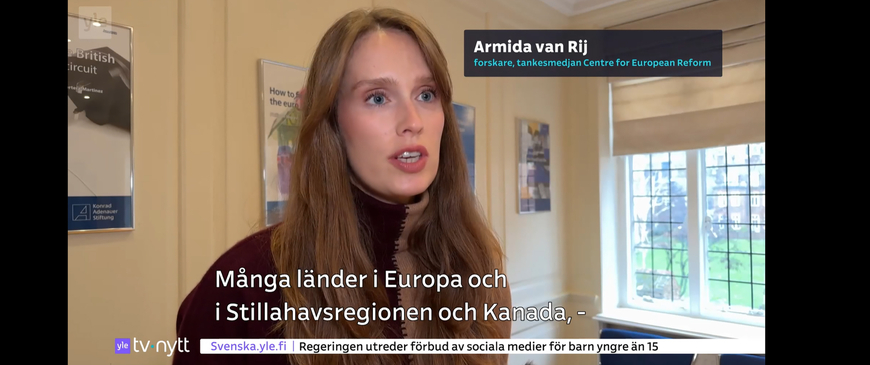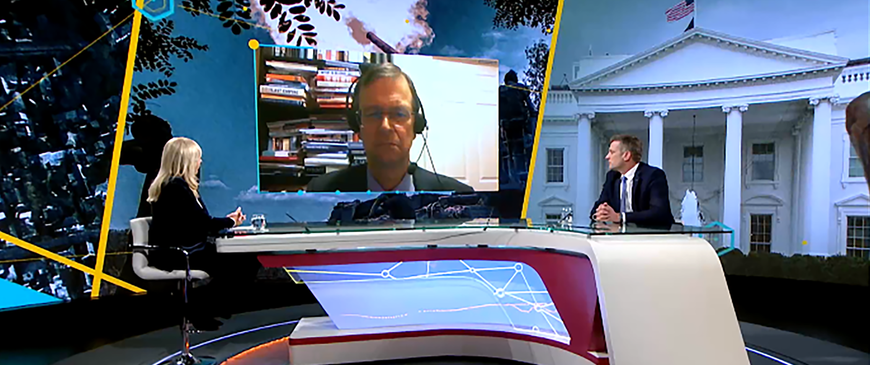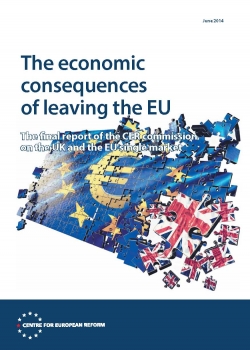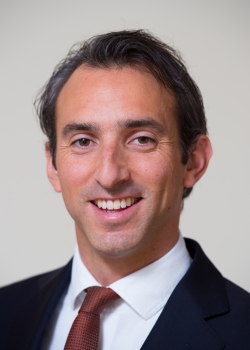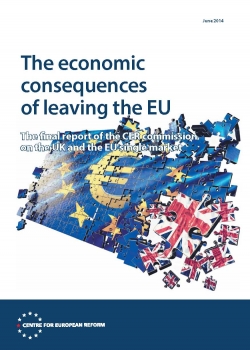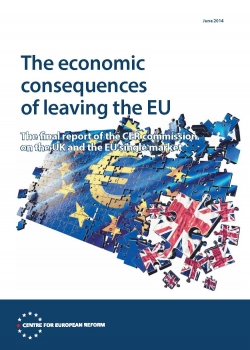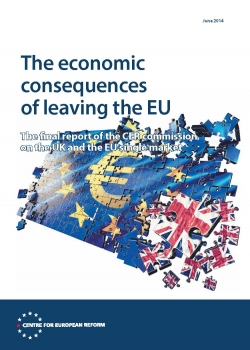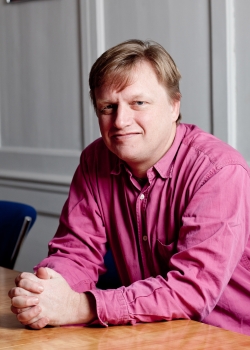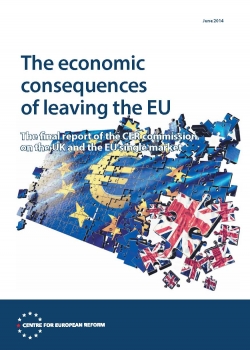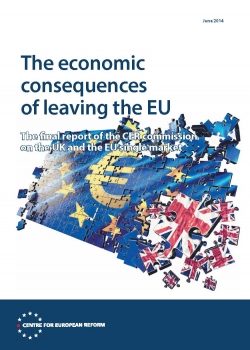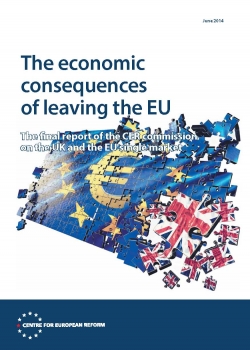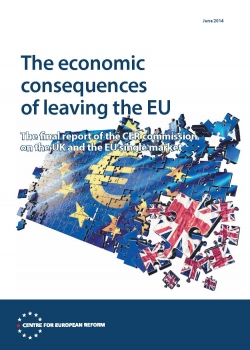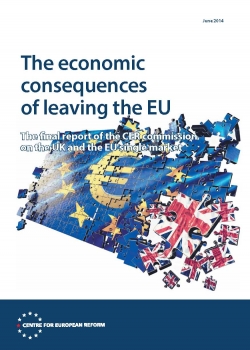Press
UK could make its way in the world outside EU
22 June 2014
The Telegraph
I was pleased that the recent report by the CER was temperate in its language. I support its contention that there is no half-way house that would allow the UK to have its cake and eat it.
Cameron miscalculates in battle to stop Juncker presidency
20 June 2014
Financial Times
Charles Grant, director of the Centre for European Reform, said the episode was a salutary lesson for Mr Cameron as he looks to Ms Merkel to help him secure EU reforms. “She has a number of priorities and keeping David Cameron on board is only one of them,” he said.
Csúcsra jár az európai casting
18 June 2014
Nol.hu
Nagyon intenzív diplomáciai tevékenységet folytat Nagy-Britannia az elkövetkező tíz napban – jósolta lapunknak Rem Korteweg CER. Korteweg nem hiszi, hogy Matteo Renzi végül szembeszegülne az Európai Parlamenttel (EP)
Europe and Scotland - can't live with them, can't live without them
16 June 2014
The Telegraph
According to modelling by the CER, Britain’s EU membership has boosted its trade in goods with other member states by 55 per cent.
Cameron's 'Stop Juncker' drive seen as lose-lose strategy
16 June 2014
Reuters
"He [Cameron] has painted himself into a really difficult corner," Rem Korteweg, a senior research fellow at the Centre for European Reform in London, a think-tank, told Reuters.
British exit from the EU a deterrence for R&D investment, warns a new report
12 June 2014
Science|Business
The UK would lose its heft in key manufacturing industries, face heavy research funding shortfalls and risk brain drain were it to leave the European Union, according to a new report.
No shelter for Britain in European halfway houses
12 June 2014
Financial Times
The conclusion of the CER's report is stark: all conceivable halfway houses would deliver the lack of influence that comes from being outside the EU with the lack of independence from being inside it. “In” or “out” is the choice: of the two, the first would be vastly better.
Cameron's allies vote to embrace Merkel's political foes
12 June 2014
Financial Times
“The Tories are having to understand that Berlin won’t bail them out when they need help,” said Charles Grant. “The British need to get real on Juncker. They have almost certainly lost the battle and need to start negotiating a good deal.”
Need for UK nuclear stressed by climate campaigners
11 June 2014
PennEnergy
The need for nuclear was backed-up by Stephen Tindale, associate fellow at the Centre for European Reform. “I spent 20 years campaigning against nuclear and then realised I was wrong: it’s low carbon. It’s a price worth paying to have a new generation of nuclear in the UK.”
EU membership a 'boon' to UK economy
10 June 2014
EU Observer
Membership of the EU has been a "boon" for the British economy, and leaving the EU “would not be an economic liberation,” according to an expert group. The conclusion is part of a 92-page report published on Monday by the London-based Centre for European Reform.
There is life after Europe, but let us stop the triumphalism
10 June 2014
The Telegraph
Nor should Brexit be about the alleged suffocation of Britain by EU regulation. As the Centre for European Reform argues in its new report, this is greatly overblown.
Video interview on 'The economic consequences of leaving the EU'
09 June 2014
John Springford and Simon Tilford discuss the final report of the CER commission on the UK and the EU single market.
Wise Men warn on dangerous delusions of Brexit
09 June 2014
The Telegraph
Withdrawal from the EU would nullify Britain’s trading treaties with the world in one stroke and reduce the country to a supplicant pleading for re-entry into the global system, a top panel of experts has warned.
Centre for European Reform's analysis shows benefits of EU
09 June 2014
The Guardian
The Centre for European Reform think-tank produced its final report [on the UK and EU single market] on Monday and as a dissection of Britain's economic relationship with the rest of the EU, it is hard to beat.
David Cameron faces heavy political price for opposing Juncker
08 June 2014
Financial Times
But Charles Grant, director of the Centre for European Reform, says that by being “so shrill and outspoken in public”, the British may have made it harder for others to abandon Mr Juncker.
UK 'would not be freer' after leaving EU
08 June 2014
Financial Times
“A bonfire of European rules would not transform Britain’s economic prospects,” according to the final report of the CER commission on the UK and the EU single market. “The idea that the UK would be freer outside the EU is based on a series of misconceptions”.
Obama vows to stand with Ukraine
06 June 2014
CCTV News
Rem Korteweg, senior research fellow at the CER, talks to The Heat about President Obama's relations with Europe (from 18:19).
Why Britain still wants to fight Europe on the beaches
06 June 2014
The Guardian
Charles Grant, director of the CER, says that part of Britons' tepid attitudes to the EU, is that we "had a jolly good war and think all the others were either on the wrong side or ran away and were defeated".
British opposition to Juncker shows no sign of abating
06 June 2014
Agence France Presse
"It is possible that if he [Juncker] becomes EU Commission president, he will be much less convenable to Cameron's desire to negotiate and repatriate some powers that he would have been if Cameron had supported him," Stephen Tindale told AFP.
"I will not be forced to get on my knees before the British" - Juncker
06 June 2014
The Voice of Russia (Radio)
Stephen Tindale, associate fellow at the Centre for European Reform, talks to Voice of Russia UK Radio about relations between David Cameron and Jean-Claude Juncker (listen from 00:42).

